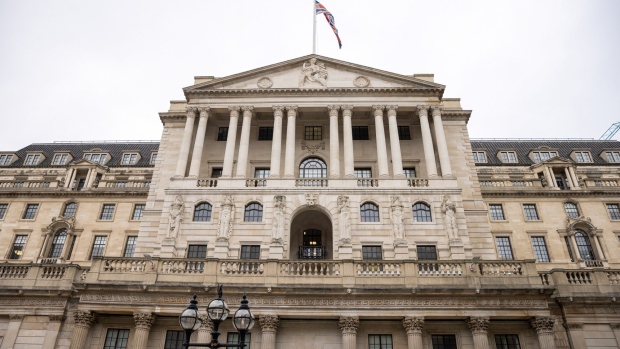Apr 17, 2024
Traders Favor One BOE Cut in 2024 After Hot Inflation Data
, Bloomberg News

(Bloomberg) -- Traders rushed to trim wagers on the extent of monetary easing by the Bank of England this year after UK inflation slowed less than expected.
Traders moved to fully price one quarter-point reduction by November and as little as a 30% chance of a second cut following the data. That later pared, making a second cut a coin toss.
It’s a setback for gilt markets, which have sold off over recent weeks as sticky US inflation cast doubts over the speed and extent of rate cuts from the Federal Reserve and central banks globally. UK bonds fell in early trading, sending the policy sensitive two-year yield up four basis points to 4.53%, the highest since late February.
“The rate-cutting BOE bus will be delayed,” said Hank Calenti, senior fixed income strategist at SMBC Nikko Capital Markets. “There is an expectations management issue here – Bailey was warning that headline inflation would bounce off 2% soon, but it’s services inflation which is driving the bus and this is still way too high.”
The prospect of higher-for-longer rates helped lift the pound from a five-month low, with sterling climbing as much as 0.4% on the day to $1.2479. It fell to $1.2406 on Tuesday, dragged down by the strong dollar.
“The data could further add weight to the comments by the more hawkish MPC members who have been highlighting the limits of the policy divergence between the BOE and the Fed in part due to the recent drop in cable,” said Valentin Marinov, head of G-10 FX research and strategy at Credit Agricole SA.
UK Inflation Stronger Than Expected on Higher Fuel Prices
The inflation data showed consumer prices rose 3.2% in March compared with a year earlier, down from 3.4% in February, the Office for National Statistics said Wednesday. While it was the lowest since September 2021, the BOE and private-sector economists had expected a reading of 3.1%.
Britain had the worst inflation problem in the Group of Seven nations last year but has brought down the pace of price increases sharply from 11% in late 2022. While Governor Andrew Bailey and his colleagues expect it to drop to the 2% target later this year, they’re looking for more firm evidence that those pressures will subside before acting.
Wages are also giving BOE officials pause for thought. Data on Tuesday showed wages excluding bonuses are still rising at a faster-than-expected annual rate of 6%, though an unexpected jump in unemployment underlined that fact that tight monetary policy is biting.
Mark Dowding, chief investment officer at RBC BlueBay Asset Management, is particularly pessimistic on the prospect of easing given the UK’s inflationary pressures. If the BOE does ease, it could reflect political pressure with the ruling Conservatives keen to boost the economy ahead of the general election.
“We don’t think there should be any rate cuts at all. But in practice, one cut could occur as a political favor to the government, but this is unlikely to be repeated,” Dowding said.
--With assistance from Naomi Tajitsu, James Hirai, Anchalee Worrachate and Alice Atkins.
(Updates with additional quotes from paragraph four.)
©2024 Bloomberg L.P.






